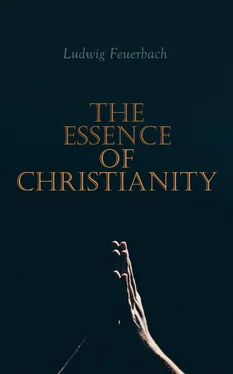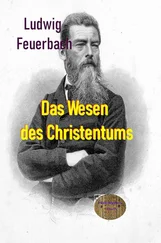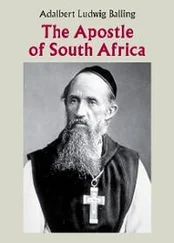Now, by what means does man deliver himself from this state of disunion between himself and the perfect being, from the painful consciousness of sin, from the distressing sense of his own nothingness? How does he blunt the fatal sting of sin? Only by this; that he is conscious of love as the highest, the absolute power and truth, that he regards the Divine Being not only as a law, as a moral being, as a being of the understanding; but also as a loving, tender, even subjective human being (that is, as having sympathy with individual man).
The understanding judges only according to the stringency of law; the heart accommodates itself, is considerate, lenient, relenting, κατ’ ἄνθρωπον. No man is sufficient for the law which moral perfection sets before us; but, for that reason, neither is the law sufficient for man, for the heart. The law condemns; the heart has compassion even on the sinner. The law affirms me only as an abstract being,—love, as a real being. Love gives me the consciousness that I am a man; the law only the consciousness that I am a sinner, that I am worthless. 6The law holds man in bondage; love makes him free.
Love is the middle term, the substantial bond, the principle of reconciliation between the perfect and the imperfect, the sinless and sinful being, the universal and the individual, the divine and the human. Love is God himself, and apart from it there is no God. Love makes man God and God man. Love strengthens the weak and weakens the strong, abases the high and raises the lowly, idealises matter and materialises spirit. Love is the true unity of God and man, of spirit and nature. In love common nature is spirit, and the pre-eminent spirit is nature. Love is to deny spirit from the point of view of spirit, to deny matter from the point of view of matter. Love is materialism; immaterial love is a chimæra. In the longing of love after the distant object, the abstract idealist involuntarily confirms the truth of sensuousness. But love is also the idealism of nature—love is also spirit, esprit . Love alone makes the nightingale a songstress; love alone gives the plant its corolla. And what wonders does not love work in our social life! What faith, creed, opinion separates, love unites. Love even, humorously enough, identifies the high noblesse with the people. What the old mystics said of God, that he is the highest and yet the commonest being, applies in truth to love, and that not a visionary, imaginary love—no! a real love, a love which has flesh and blood, which vibrates as an almighty force through all living.
Yes, it applies only to the love which has flesh and blood, for only this can absolve from the sins which flesh and blood commit. A merely moral being cannot forgive what is contrary to the law of morality. That which denies the law is denied by the law. The moral judge, who does not infuse human blood into his judgment judges the sinner relentlessly, inexorably. Since, then, God is regarded as a sin-pardoning being, he is posited, not indeed as an unmoral, but as more than a moral being—in a word, as a human being. The negation or annulling of sin is the negation of abstract moral rectitude,—the positing of love, mercy, sensuous life. Not abstract beings—no! only sensuous, living beings are merciful. Mercy is the justice of sensuous life . 7Hence God does not forgive the sins of men as the abstract God of the understanding, but as man, as the God made flesh, the visible God. God as man sins not, it is true, but he knows, he takes on himself, the sufferings, the wants, the needs of sensuous beings. The blood of Christ cleanses us from our sins in the eyes of God; it is only his human blood that makes God merciful, allays his anger; that is, our sins are forgiven us because we are no abstract beings, but creatures of flesh and blood. 8
1.In religion, the representation or expression of the nothingness of man before God is the anger of God; for as the love of God is the affirmation, his anger is the negation of man. But even this anger is not taken in earnest. “God ... is not really angry. He is not thoroughly in earnest even when we think that he is angry, and punishes.”—Luther (Th. viii. p. 208).
2.Luther, Concordienbuch, Art. 8, Erklär.
3.Luther, Sämmtliche Schriften und Werke, Leipzig, 1729, fol. Th. iii. p. 589. It is according to this edition that references are given throughout the present work.
4.Predigten etzlicher Lehrer vor und zu Tauleri Zeiten, Hamburg, 1621, p. 81.
5.“That which, in our own judgment, derogates from our self-conceit, humiliates us. Thus the moral law inevitably humiliates every man when he compares with it the sensual tendency of his nature.”—Kant, Kritik der prakt. Vernunft, 4th edition, p. 132.
6.“Omnes peccavimus.... Parricide cum lega cæperunt et illis facinus pœna monstravit.”—Seneca. “The law destroys us.”—Luther (Th. xvi. s. 320).
7.“Das Rechtsgefühl der Sinnlichkeit.”
8.“This, my God and Lord, has taken upon him my nature, flesh and blood such as I have, and has been tempted and has suffered in all things like me, but without sin; therefore he can have pity on my weakness.—Hebrews v. Luther (Th. xvi. s. 533). “The deeper we can bring Christ into the flesh the better.”—(Ibid. s. 565.) “God himself, when he is dealt with out of Christ, is a terrible God, for no consolation is found in him, but pure anger and disfavour.”—(Th. xv. s. 298.)
CHAPTER IV.
THE MYSTERY OF THE INCARNATION; OR, GOD AS LOVE, AS A BEING OF THE HEART.
Table of Contents
It is the consciousness of love by which man reconciles himself with God, or rather with his own nature as represented in the moral law. The consciousness of the divine love, or what is the same thing, the contemplation of God as human, is the mystery of the Incarnation. The Incarnation is nothing else than the practical, material manifestation of the human nature of God. God did not become man for his own sake; the need, the want of man—a want which still exists in the religious sentiment—was the cause of the Incarnation. God became man out of mercy: thus he was in himself already a human God before he became an actual man; for human want, human misery, went to his heart. The Incarnation was a tear of the divine compassion, and hence it was only the visible advent of a Being having human feelings, and therefore essentially human.
If in the Incarnation we stop short at the fact of God becoming man, it certainly appears a surprising, inexplicable, marvellous event. But the incarnate God is only the apparent manifestation of deified man; for the descent of God to man is necessarily preceded by the exaltation of man to God. Man was already in God, was already God himself, before God became man, i.e. , showed himself as man. 1How otherwise could God have become man? The old maxim, ex nihilo nihil fit, is applicable here also. A king who has not the welfare of his subjects at heart, who, while seated on his throne, does not mentally live with them in their dwellings, who, in feeling, is not, as the people say, “a common man,” such a king will not descend bodily from his throne to make his people happy by his personal presence. Thus, has not the subject risen to be a king before the king descends to be a subject? And if the subject feels himself honoured and made happy by the personal presence of his king, does this feeling refer merely to the bodily presence, and not rather to the manifestation of the disposition, of the philanthropic nature which is the cause of the appearance? But that which in the truth of religion is the cause, takes in the consciousness of religion the form of a consequence; and so here the raising of man to God is made a consequence of the humiliation or descent of God to man. God, says religion, made himself human that he might make man divine. 2
Читать дальше












